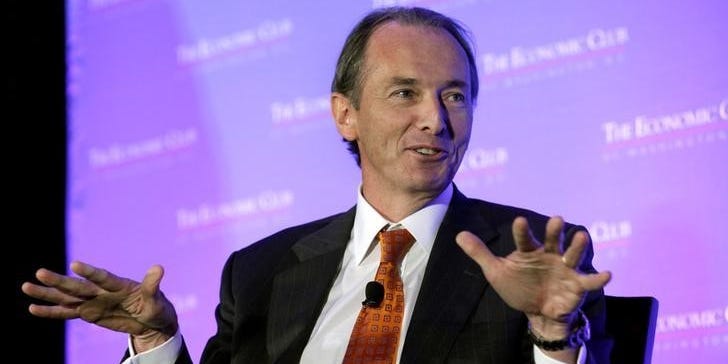- Morgan Stanley CEO James Gorman is "pretty relaxed" about the prospects of an economic recession.
- He sees a 50-50 chance that a recession occurs as consumers grapple with rising inflation and higher interest rates.
- "I don't think we're falling into some massive hole over the next few years. I think eventually the Fed will get hold of inflation," Gorman said.
The chances of an economic recession are essentially a coin flip, according to Morgan Stanley CEO James Gorman.
At an investor conference on Monday, Gorman said he is feeling "pretty relaxed" about the prospects of a downturn, adding that any such decline would likely be short-lived.
"We've had plenty of cycles where things look shaky and the market tells a different story. I wouldn't say I'm totally relaxed, but I'm pretty relaxed," he said.
"There was a legitimate recession risk. I used to think it was about 30%. It's probably more like 50% now, it's not 100%. It behooves you to be a little cautious," he added.
The forecast adds to a pile of Wall Street bank CEOs talking about the imminent threat of a recession. Most notably, JPMorgan CEO Jamie Dimon has referred to the current economic outlook as a "hurricane" on the horizon that requires preparation by investors and companies.
The concerns linger as consumers grapple with high inflation and rising interest rates, with the Federal Reserve expected to raise rates by 75 basis points on Wednesday.
But Gorman has confidence in the Fed's ability to eventually regain control of inflation. "I don't think we're falling into some massive hole over the next few years. I think eventually the Fed will get hold of inflation," he said.
Gorman said that while an economic downturn could "fatally damage" some institutions, most US banks are in good financial shape, including Morgan Stanley, which he said has a strong liquidity position and solid credit profile.
And while Gorman is feeling pretty OK about the underlying economy, much of his risk-focus is centered around data stability and cyber threats "given where we are around the world and some of the geopolitical uncertainty associated with that."
Still, the S&P 500 is down 20% year-to-date and officially entered a bear market on Monday, while the tech-heavy Nasdaq 100 is down about 30% over the same time period. Gorman acknowledged that investors likely won't see a recovery anytime soon.
"You know that it's going to be bumpy; people's 401(k) plans are going to be down this year," he said.
